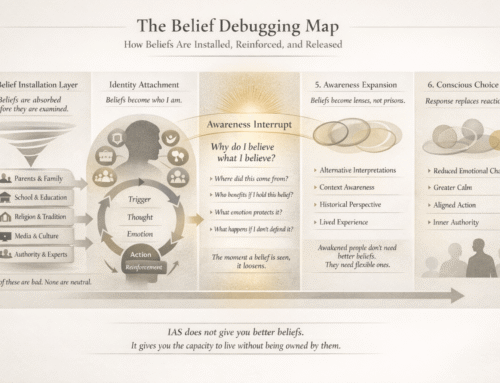You’ve always felt it—a pull, a whisper, a knowing deeper than logic. Intuition. It isn’t magic. It isn’t unreliable when wielded well.
For the intuitive person in business, intuition is one of your greatest assets. Learning to follow it transforms everything: decisions, content, identity, relationships, success.
Alan Watts gives us a metaphor: treat yourself like a cloud or a wave. Clouds never worry about being misshapen. Waves don’t fret about being imperfect. They just are. And in that being, they flow with a deeper intelligence.
This post explores:
-
What intuition is (and isn’t)
-
Why many people distrust their own intuitive judgment
-
How intuition links with self‑confidence & identity
-
Practical ways to cultivate, test, and lean on your intuition in business
-
A system for integrating intuition into decision‑making
-
Real‑world examples
1. What Intuition Absolutely Is
Intuition is the “quick knowing” that arises without conscious reasoning. It is:
-
The sum of your past experiences, implicit learning, pattern recognition.
-
A compass built from subconscious data: your body, emotions, instincts, often what logic can’t see immediately.
-
A clarity of direction rather than a rigorous blueprint.
Watts suggests we’re natural beings, like clouds or waves, whose forms are ever‑changing yet somehow always “right” in the big flow. Because nature is intelligent. Intuition is that intelligence living in you.
But there are limits and misinterpretations. Intuition is not:
-
Gut‑reactions unchecked by reflection
-
Blind leaps without awareness
-
A way to avoid responsibility
Intuition works best when guided by an ethical core, anchored in truth, informed by experience.
2. Why People Distrust Their Own Intuition
Many solopreneurs, especially those trained in structured, analytical environments (banking, corporate, etc.), suffer from what Watts describes as “a dither of doubt.” We’re taught that decisions should be grounded only in measurable data, logic, validation, peer approval. When intuitive judgment doesn’t come with proof, we hesitate.
In your life, having come from banking, you’ve likely seen these moments:
-
When a customer offers a “sweetener” or bribe to get what they want—tempting, but dishonest.
-
When rules offer rigid clarity—but break down in weird cases.
-
When doing “what the market expects” feels hollow.
This training builds analytical strength—but often at the cost of suppressing your intuitive voice. The voice that says “something doesn’t feel right,” or “this path seems more aligned.” That voice becomes quieter, second guessed, drowned out by Risk Aversion, Fear of Reputation, and the need for external validation.
When I was in banking and consulting, before making decisions, I would seek out as as much information as possible. However, it gets to a point where you have to make a decision, even though you may not have as much information as you would like. I always tried to follow my intuition and if I went against it, I almost always regretted it. By observing the outcome of my own decisions, both good and bad, I quickly learned to trust my intuition, as it was almost infallible. The difficulty is that when you have to explain your decision to someone else, ‘intuition‘ is a difficult concept from which to launch a persuasive argument. One more reason for being a solopreneur – I only have to answer to myself (and my customer of course.)
How do you follow your intuition, you ask? Follow your feelings – if you feel good about the decision but can’t fully explain why using logic, then that is your subconscious speaking to you.
3. Self‑Confidence, Identity, & Intuition
Watts teaches that to trust intuition you must first trust yourself. He uses the metaphor: “regard yourself as a cloud or wave … you can’t make a mistake whatever you do … through that capacity … you can trust your own intuition.”
A few lessons for self‑confidence:
-
Self‑confidence isn’t arrogance; it’s being comfortable with uncertainty and occasional mistakes.
-
Confidence grows when you let your intuitive decisions “play out” and see how even what looks like a mess often contributes. Because, like the cloud, “it all comes out in the wash.”
-
Confidence also means no longer needing constant reassurance—or outward perfection.
Your identity as someone who honours their intuitive wisdom becomes a foundation. From that identity, many business choices become clearer: what offers you accept, how you market, what contracts you take.
4. Intuition + Authenticity: The Connection
Authenticity is the alignment between who you are inside and how you show up outside. When you follow intuition, you lean into authenticity. When you deny intuition, you build masks.
As a banker, I had many moments where observing or refusing bribes, speaking truth, enforcing rules—even when unpopular—were choices to honour integrity over approval. Those choices, though costly, seeded my authenticity.
In business, authenticity is more than “being real” as a marketing tagline. It’s consistency between values, actions, and voice. The followers, clients, or partners who resonate most are those who sense that authenticity. They connect with someone who “means it”—not someone who sells what others claim works.
5. Practical Ways to Harness Your Intuition in Business
Here’s how you move intuition from occasional whisper to steady guide.
A. Practices that cultivate intuitive clarity
-
Regular Quiet Time — early morning silence; walks; meditation; journaling
-
Embodied Awareness — tune into body sensations when deciding; gut tightness, excitement, resistance
-
Reflective Journaling of Decisions — note down intuitive decisions, outcome, what felt true / false. (By reading my blog, you are reading the journal of my business journey including what I am reading and thinking about whilst building my business!)
B. Testing & Validating Intuition
-
Use small experiments — trust intuition on low‑risk choices first.
-
Trade speed for feedback: act quickly, observe result, iterate.
-
Test with data: intuition + metrics = wisdom. Your intuition suggests a direction; data shows when you need correction.
C. Combining Intuition with Systems
Intuition doesn’t & shouldn’t replace systems. Instead, systems protect intuition from chaos; intuition shapes systems from rigidity.
Here’s where IMMachines thrives: you have frameworks, repeatable GPTs, content engines. Intuition can inform where to run experiments, which frameworks to double down, which to retire.
6. A System for Using Intuition in a Solopreneur Business
To make intuition a real lever, you need a system. Below is one I suggest:
The I‑T.R.U.S.T. System
| Step | What You Do | Why It Helps |
|---|---|---|
| I = Introspect | Daily morning check‑ins: what feels aligned / misaligned? What decisions loom? Listen to what’s arising. | Builds awareness of inner cues before demands of the day override them. |
| T = Tune‑out noise | Schedule periods with no social media, no market comparisons, no external opinions. | Quiet allows intuition to be heard. |
| R = Reflective Recording | Maintain a “decision log” with what your intuition felt, what logic said, what decision you made, and result. | Over time builds calibration — you learn to tell confidence signals vs fear. |
| U = Unforced Action | When intuition and logic align, act. Don’t wait for perfect, don’t overthink. | Momentum builds trust. |
| S = Systems & Safeguards | Use frameworks, checklists, peer feedback to catch where bias or delusion might sneak in. | Prevents overconfidence or ego driven mis‑intuition. |
| T = Trust Cycle | Periodically review: what intuitive choices worked? Which didn’t? How did you misinterpret signals? Adjust. | Improves your capacity to rely on intuition over time. |
7. Real‑World Examples & Pitfalls
-
From your banking days: saying no to bribes or unethical requests. Those were intuitive / ethical stands, seemingly costly in the short term, but built reputation and integrity in the long term.
-
Marketing / content decisions: maybe sometimes you’ve had an idea that logic said was risky or unproven, but going ahead felt right—and it worked far better than “safe” ideas.
-
Pitfall: mistaking resistance or fear for intuition. Sometimes a gut feeling is just underlying fear, not wisdom. The system above (particularly the Reflective Recording & feedback) helps you differentiate.
-
Pitfall: overcompensating, using “intuition” as excuse for laziness or lack of strategy. Watts warns of those who overhear “you can’t make mistakes” and then distort the idea—breaking all rules, distracting themselves, acting out. That’s not intuition; it’s rebellion in disguise.
8. The Long‑Term Value: How Following Intuition Shapes a Business
When you build business on your intuitive compass, you gain:
-
Sustainable identity — people know you, not the mask.
-
Higher alignment in decisions — less burnout, less dissonance.
-
Differentiation — in a crowded market, authenticity guided by intuition stands out.
-
Resilience — setbacks hurt less when you’re living in truth.
Also, intuition-informed creators often find what’s right for their audience earlier, spot opportunities others rationalize away, avoid compromises that weigh them down.
9. Balancing Intuition with Strategy & Logic
Intuition doesn’t mean abandoning strategy or planning. Instead:
-
Use strategy to map the field; intuition to choose the forks in the road.
-
Logic for execution; intuition for direction.
-
Measure, test, adapt—but don’t let strategy override truth.
In your offers, content, pricing, collaborations: apply strategy systems (funnels, content engines, offer design) after you decide what feels right.
10. Action Plan: Start Trusting Your Intuition Today
Here’s a 5‑week journey to build stronger intuitive confidence:
| Week | Focus |
|---|---|
| Week 1 | Track three decisions each day. Record what your instinct said vs what logic told you. |
| Week 2 | Practice “cloud thinking”: say to yourself “even if I make a ‘mistake,’ it will come out in the wash.” Begin small intuitive steps. |
| Week 3 | Create a “quiet hour” twice a week: no external inputs. Journal what emerges naturally. |
| Week 4 | Choose a business decision you’ve been delaying. Use the I‑T.R.U.S.T. system to decide intuitively + strategically. |
| Week 5 | Reflect: what intuition messages you missed? What signals you’re now more aware of? Adjust habits accordingly. |
11. Your Intuition as Legacy
When you follow your intuition, you build more than business. You build a legacy of truth: content that matters, clients who trust, culture that values authenticity. And for you, as someone who has stewarded truth even under pressure, it becomes not just about profit, but purpose.
Conclusion: Leap with Your Knowing
Alan Watts invites us into a middle way: not overcompensating with rebellion, not shrinking into fear, but trusting that you are like cloud, like wave. That you can’t make a mistake in the sense that whatever you do becomes part of your becoming. That authenticity isn’t always easy—but it is always light in a soul‑sense.
Follow your intuition. Let it guide. Let it ground. And let it free you.
Because when your inner knowing leads, your outer business doesn’t just make noise—it resonates.






